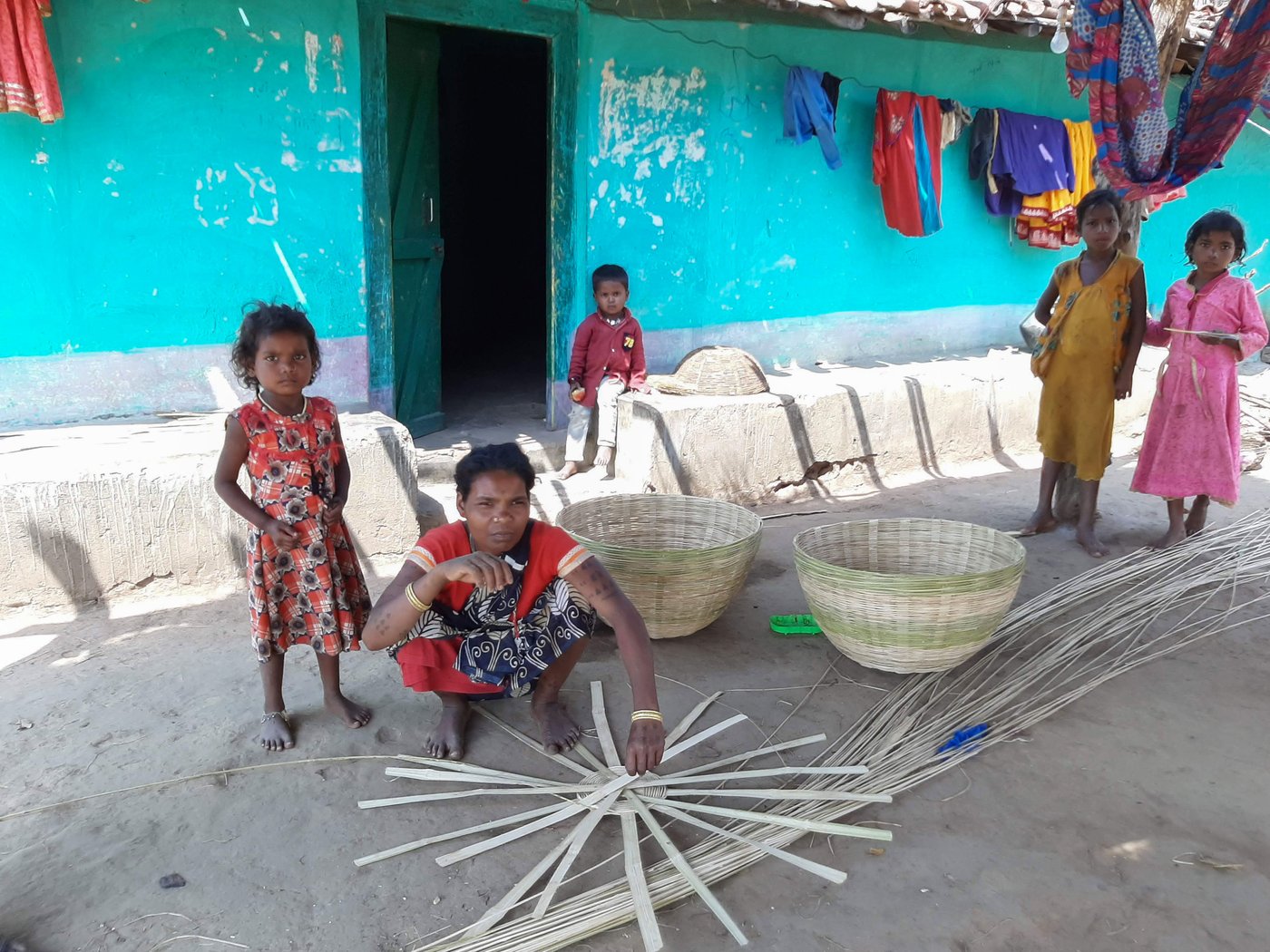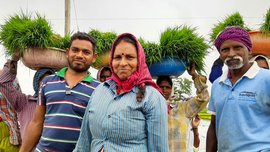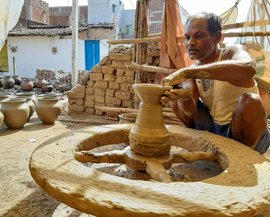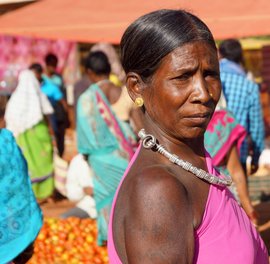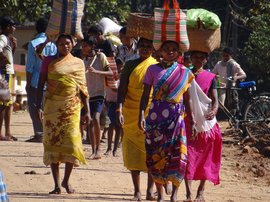“The kochia [middleman] has stopped visiting our village since the corona outbreak,” says Jamuna Bai Mandavi. “It’s already been three weeks since he last came here to buy baskets. So we are not able to sell any, and we have no money to buy anything.”
Jamuna Bai, a widow with four children, is a resident of Kauhabahra village in Nagri block of Dhamtari district. Around 40 years old, she is an Adivasi from the Kamar tribe, listed by the union Ministry of Home Affairs as a Particularly Vulnerable Tribal Group (PVTG) in Chhattisgarh. There are 36 other Kamar families like hers in this cluster of the village. All of them, like her, earn a living by collecting bamboo from the surrounding forests and weaving baskets.
The ' kochia' she’s talking about is very important to Jamuna Bai and other basket weavers. They are middlemen, or traders, who visit the village every week to buy baskets, which they then sell in retail at the town markets and village haats (markets).
Soon, it will be a month since their last appearance in Kauhabahra – they stopped coming after the Covid-19 lockdown began.
Jamuna has four children – Laleshwari, 12, who left school after Class 5, Tuleshwari, 8, Leela, 6, and Lakhmi, 4. Her husband Siyaram died, in his mid-40s, of diarrhoea four years ago, leaving her and the children in a grim survival battle. The lockdown affects not just their income from baskets, but also from other sources.
This is the season for mahua flowers (from which local liquor is made) in the forest – a source of income for the Adivasis here in lean periods.
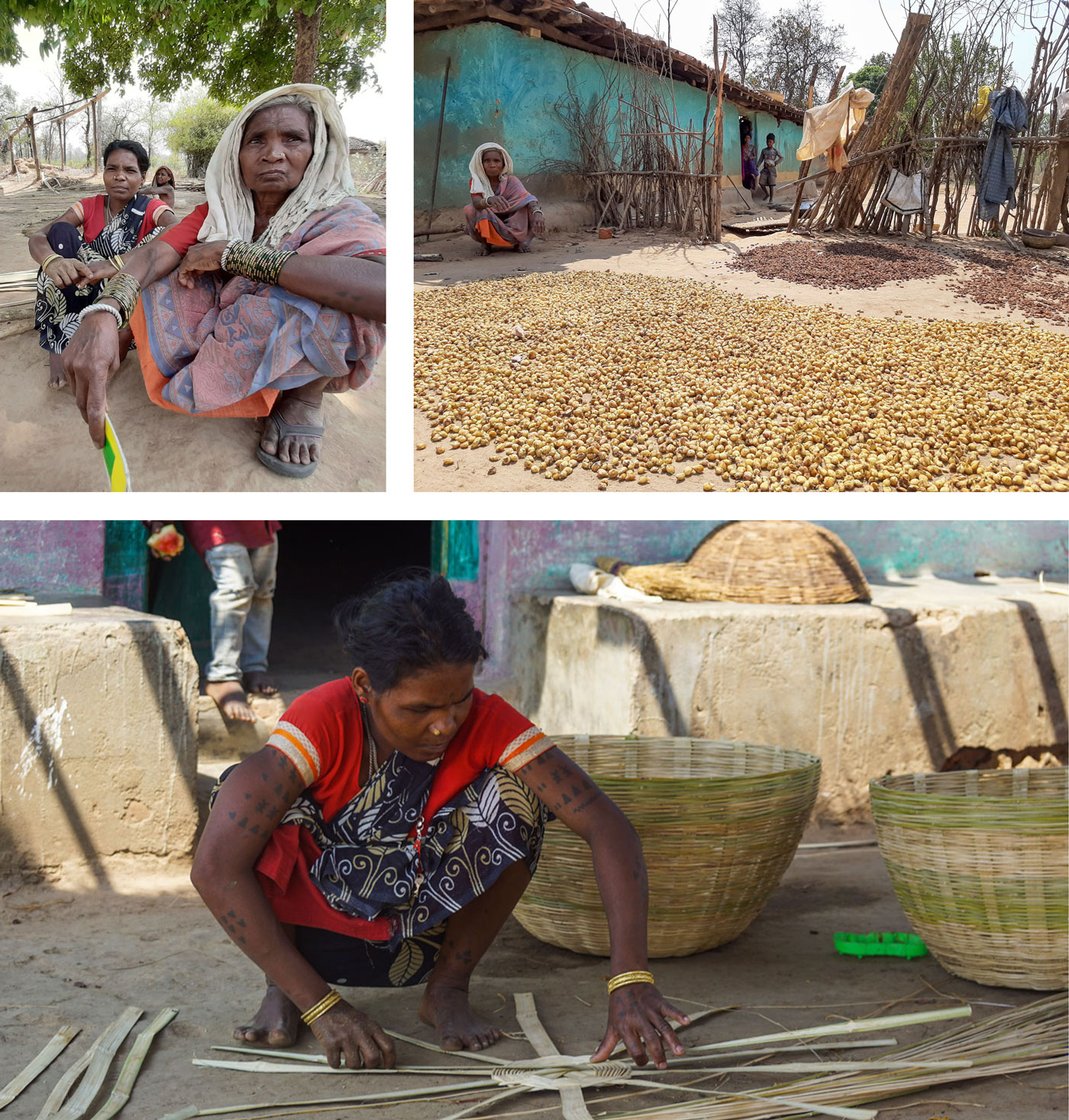
Top left: Samari Bai (foreground) and Jamuna Bai, in Kauhabahra village. Top right: Samari Bai in her backyard, where mahua flowers are kept to dry under the sun. Bottom: Jamuna Bai hasn't sold a basket since the lockdown began
“The markets and weekly haats are closed due to corona,” says Jamuna Bai. “So we are even not able to sell [as a decent price] the mahua flowers that we collect. This in turn means we are not able to buy anything for ourselves due to a lack of money.”
Jamuna Bai is entitled to a widow’s pension – Rs. 350 a month in Chhattisgarh – but she has never been enrolled for the scheme and therefore does not receive one.
The Chhattisgarh government has made serious efforts to reach its promised two months of rice – entirely free and full quota rations – to BPL (below poverty live) families across the state. They have received 70 kilograms (35 kilos for each month) free and in advance. They’ve also got four packets of salt (two for each month) free for that time. BPL families get items like sugar at subsidised rates (Rs. 17 a kilo) but have to pay for it. That’s what keeps Jamuna Bai’s family going right now.
But earnings have come to a complete halt and there is no money to buy any other essentials. Official deliveries here have not included vegetables. And some obviously poor families do not have ration cards. With the lockdown extended, things will get even more difficult for all the Kamar families in this isolated village.
Jamuna Bai and her family share their house made of wood, mud and clay tiles with her in-laws, who live separately in the rear portion of the house (they have their own ration card).
“We also earn our livelihoods by making baskets and collecting forest produce,” Samari Bai, her mother-in-law, says. “But officials have told us not to venture into the forest because of corona. So I am not going there, but my husband has been doing so these past few days to collect mahua flowers and maybe some firewood as well.”
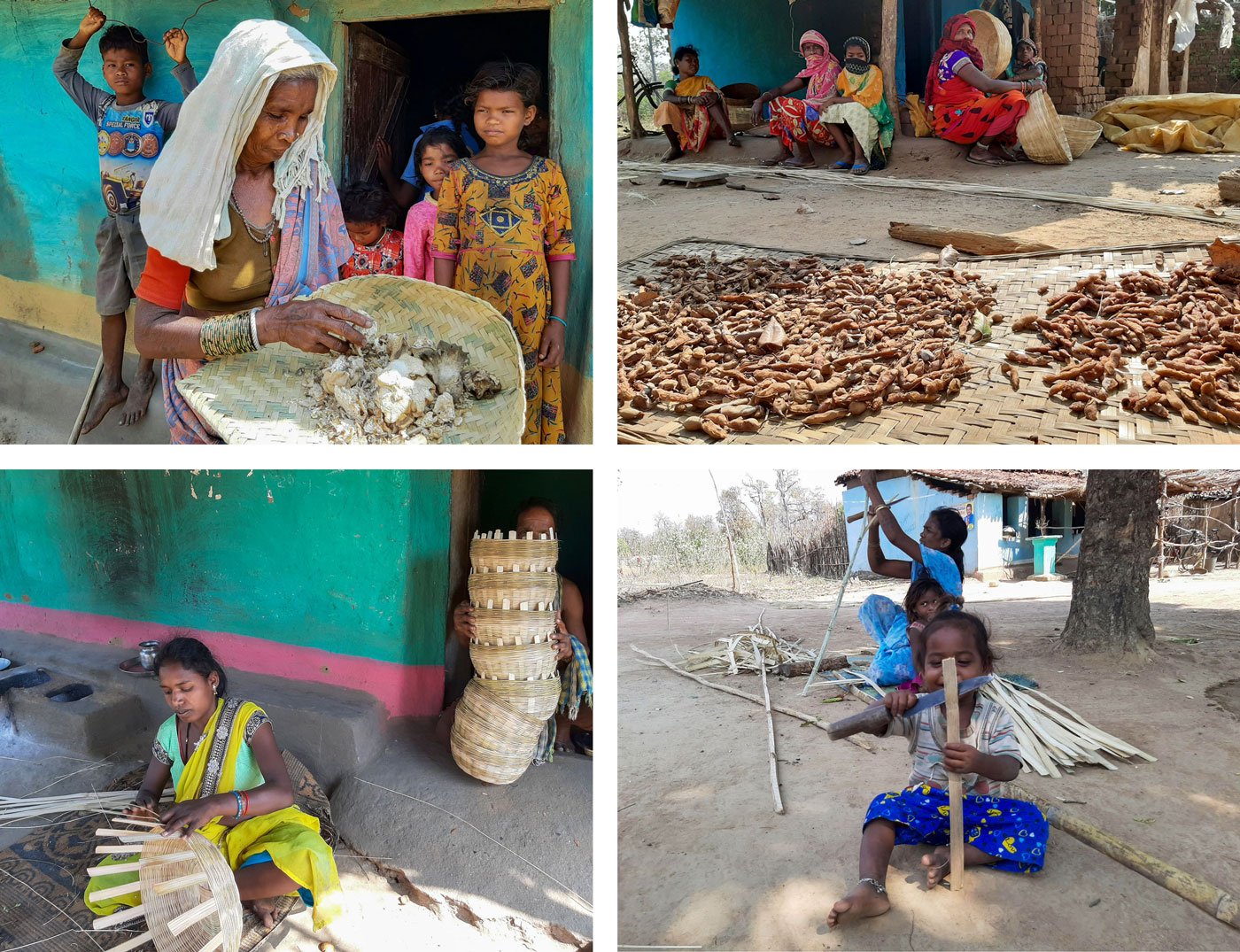
Top row: Samara Bai and others from the Kamar community depend on forest produce like wild mushrooms and taramind. Bottom left: The families of Kauhabahra earn much of their a living by weaving baskets; even children try their hand at it
“If the mahua is not collected daily on time, then it could be eaten by animals or go bad and be wasted,” says Samari Bai. Mahua is considered an Adivasi cash crop and sold at the weekly haats . The money the community gets from this, apart from what they earn selling baskets, is a significant part of what they spend on their own purchases.
“The last time the kochia visited us, I made Rs. 300 by selling him baskets. And that money was used to purchase oil, masala, soaps and other things, said Samari Bai. “But since corona came, the costs of our essential needs have doubled.”
All of Samari Bai’s four children – including Jamuna Bai’s husband Siyaram – are dead. She becomes very emotional, telling us about this. She seems to be clearly over 65 and should be getting the old age pension of Rs. 350 – but she has not been enrolled and does not receive it.
There are just 26,530 Kamars in India, according to Census 2011 (with a healthy sex ratio of 1025). Many of them, around 8,000, live in neighbouring Odisha as well. However, in that state, they have not even been recognised as an Adivasi group, let alone certified as a PVTG.
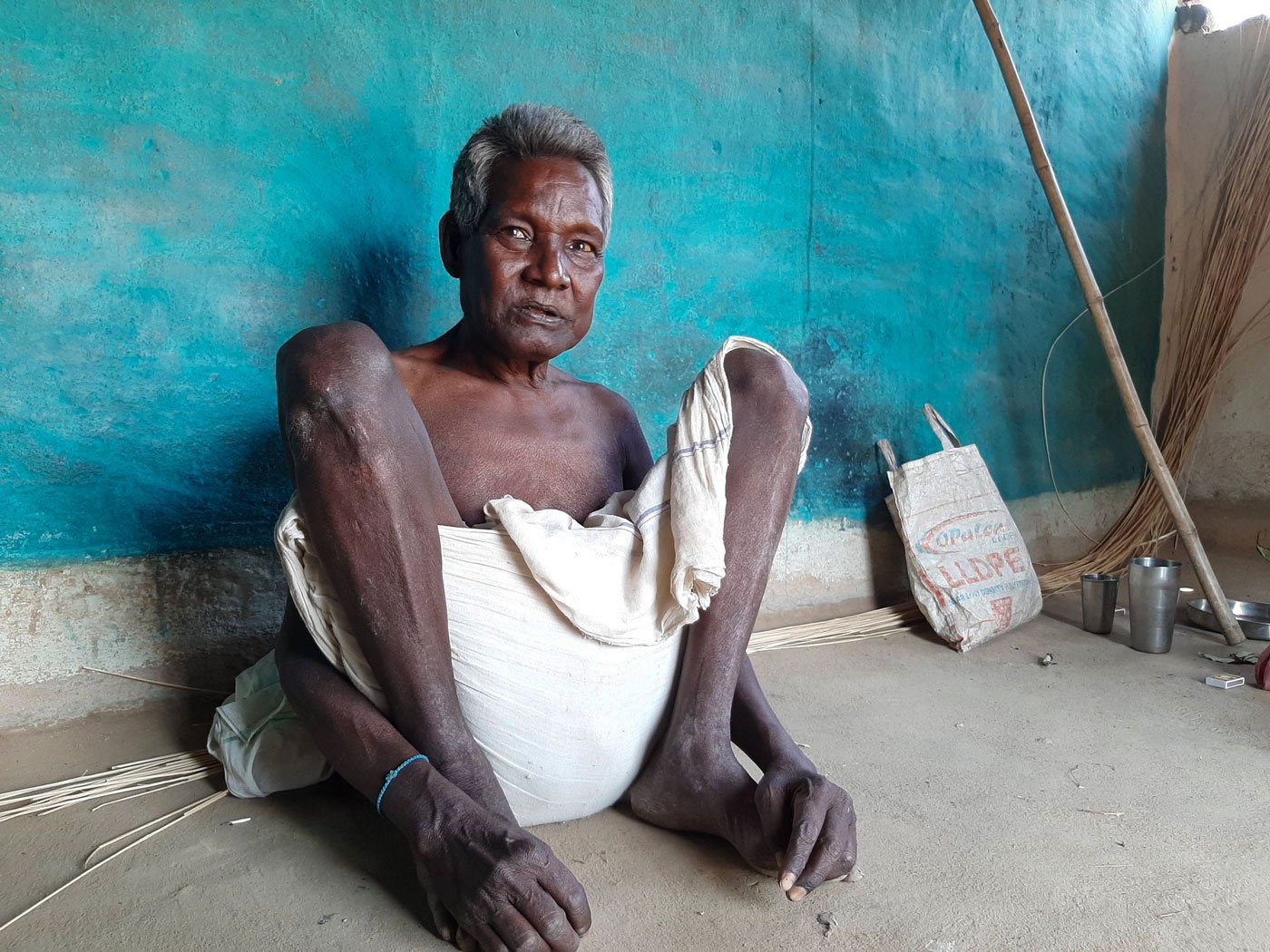
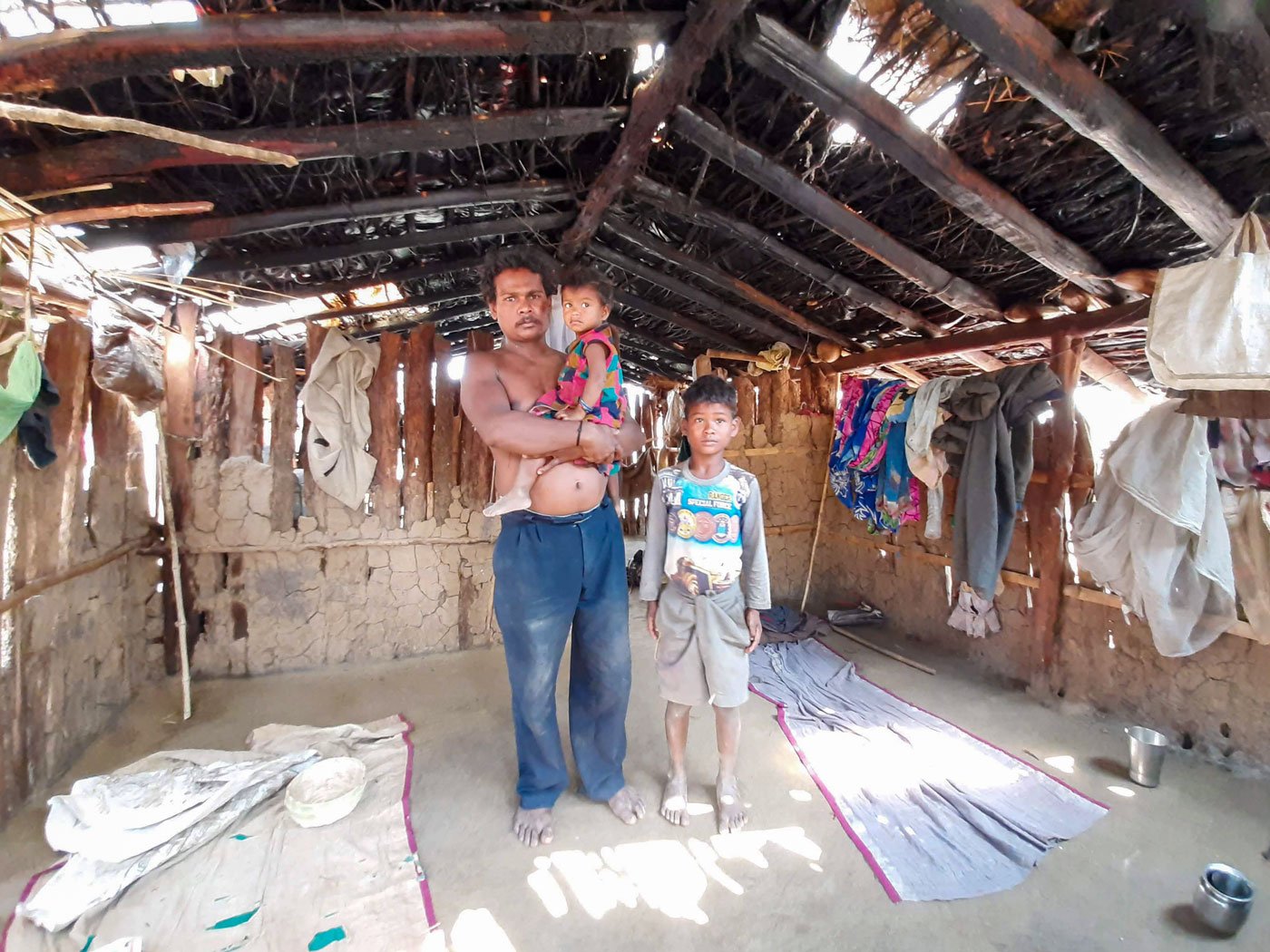
Left: Sunaram Kunjam sits alone in his mud home; he too is not receiving an old age pension. Right: Ghasiram Netam with his daughter and son; his wife was gathering mahua flowers from the forest – they are being forced to sell the mahua at very low rates
Back in Kauhabahra, another elder, Sunaram Kunjam, over 65 years, says that he too is not receiving an old age pension. “I am old and weak and unable to work anymore. I depend on my son’s family,” he tells us in his mud home. “My son is a daily wage farm labourer but gets no work these days. So today both he and my daughter-in-law have gone to the forest to collect mahua flowers.”
The Adivasis are being forced to sell the mahua at very low rates – a distress sale. “Now people in nearby villages don’t have money to buy our baskets, so we have stopped making them,” says Ghasiram Netam, 35. “My wife and I are both collecting mahua . Since the haats are closed, I sold around 9 kilos at a nearby shop for Rs. 23 per kilogram.” At the haat, he would get up to Rs. 30 for a kilo.
Ghasiram has five children, one of whom, Mayawati, left school after Class 5. He did not want her to. “I tried a lot, but Mayawati did not get a seat in any boarding school for tribal students. So she has stopped studying further,” he says. Others like her couldn’t get in because they could not produce a caste certificate.
The villagers here – already weakened by malnutrition, mired in poverty, excluded from many social services or welfare measures – are particularly vulnerable during a pandemic. The lockdown has severed their livelihood chain, though many are trying to retrieve parts of it – they’ve gone into the forest looking for mahua flowers.
